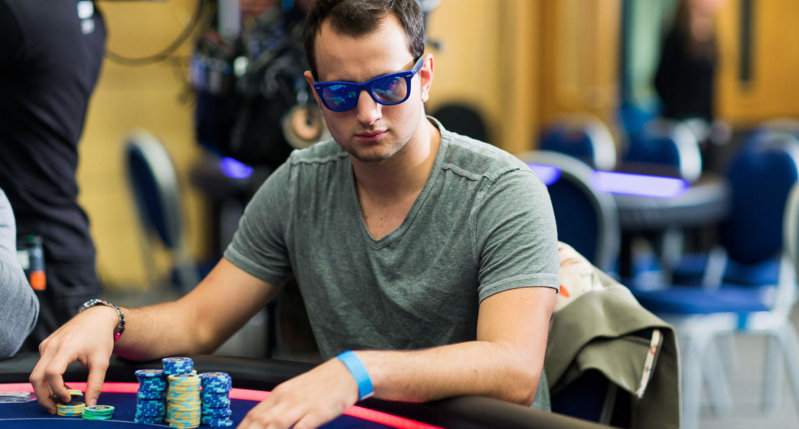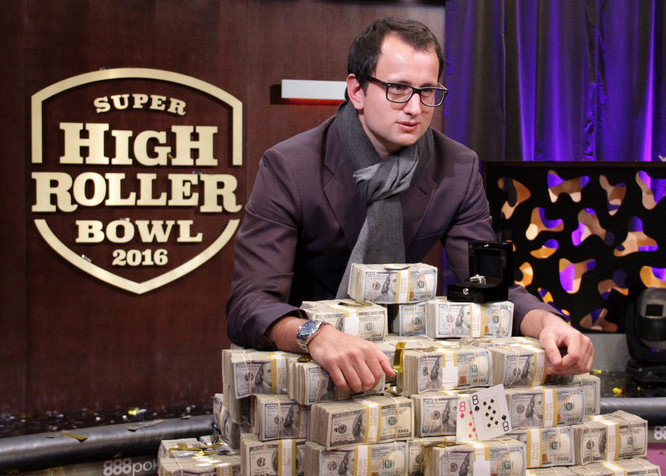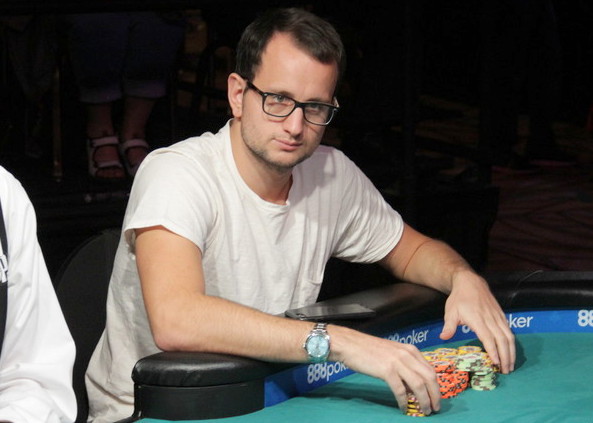






Poker Pro Rainer Kempe: Not Much ‘Room To Be An Entertainer’ On High Roller CircuitGerman Poker Pro Talks About His Start In Poker, Bragging Rights, and Managing Expectations |
|
|

Rainer Kempe parlayed a 2015 World Series of Poker final table-finish and a deep run in the EPT Barcelona main event into a quick entrance on the high roller circuit. He won almost immediately, taking down the €25,000 buy-in EPT Prague high roller in December of that year.
After another big score at Aria in the spring, Kempe returned to Las Vegas that summer for the $300,000 buy-in Super High Roller Bowl. Kempe topped a stacked field of 49 players, including a final table with the likes of Bryn Kenney, Phil Hellmuth, Erik Seidel, and fellow German poker prodigy Fedor Holz. He picked up $5 million for the win.
Kempe continued to rack up scores on the high roller circuit throughout 2016 and 2017, highlighted by a final-table run in the $111,111 buy-in One Drop event at the WSOP, and a win at the $25,000 Five Diamond World Poker Classic.
In 2018, he stepped things up with a couple big cashes in Macau, followed by a third-place showing in the Super High Roller Bowl China for $2,039,357. He wrapped up his spring with a runner-up performance at the MILLIONS Grand Final Barcelona, before picking up seven high roller cashes that summer, along with two wins.
Kempe’s 2019 campaign is already off to a fantastic start. He opened the year in the Bahamas with a fourth-place finish in the PokerStars Caribbean Adventure $25,000 high roller for $177,380, and then won the $50,000 high roller the very next day for $908,100. He closed the series by winning the $10,000 bounty turbo event for another $117,280. His next stop was Melbourne for the Aussie Millions, where he scored another victory, this time in the AUD$25,000 high roller for $595,055. He also took fourth in the AUD$100,000 high roller for $325,987.
Most recently, Kempe earned an L.A. Poker Classic trophy for taking down the $25,000 high roller at Commerce Casino, banking $270,905. He currently sits in fourth place in the Card Player Player of the Year race. In total, Kempe has earned $19.7 million in less than five years on the tournament circuit, which is good enough for no. 2 on Germany’s all-time money list and no. 22 overall.
Card Player was able to catch up with Kempe between tournament stops to talk about his start in poker, his SHRB win, bragging rights with Fedor, and managing expectations on the high roller circuit.
JR: Can you talk about what you were interested in before you found poker? What about your siblings?
RK: I grew up pretty committed to competitive soccer. I also have a background in gaming, which I found to be a good combination when I was getting into poker. Because of that, I think I have a tendency to do well with the decision-making aspects of poker, rather than playing for the results. My sisters opted to go for more traditional careers as doctors.
JR: When did poker make its way into the picture? Do you remember anything from those early games?
RK: I was actually introduced to poker during the final year of high school. I only played occasionally, just small €1 buy-in types of games with my friends. Honestly, I didn’t get hooked, and ended up not playing for a while.

Kempe at the World Series of Poker
I remember during that time that I ran into Shane Sigsbee during a family vacation. He had a stable, and agreed to screen my skill, which lasted all of about one hour. Let’s just say he was not at all impressed by my play back then, so that didn’t end up working out.
JR: I read that you transferred from a university in Germany to a school in England, and started taking poker more seriously during this time. What renewed your interest in the game, and how did you progress as a player?
RK: As I hinted at earlier, I just surrounded myself with a great group of people, Team GatsbyKempinho. This included guys like Fedor Holz, Koray Aldemir, BenCB, and Steffen Sontheimer just to name a few.
I eventually ended up moving in with Ben and Steffen in Brighton. At the time, my main focus was still on sit-n-go’s and studying. As I gradually moved up in stakes, my focus on the game only increased.
JR: Did you graduate from school and immediately jump into poker? Did you ever consider a more traditional job, or were your poker results just too successful to ignore? What did your family think of your decision to play poker professionally? Were there any times when you considered doing something else?
RK: Well as your question basically hints at, I had a focus on a traditional career until I felt like it would be foolish not to focus on poker. Nothing else concrete ever came up that I felt like I wanted to spend as much time on.
My dad was weirdly excited when I told him I wanted to play poker. He’s been supportive of it from the beginning. My mom was worried for a while, but it has got better since I play live poker so much now and she can rail. She feels like she knows what’s going on more.
JR: You had a breakout year in 2015, with good results at Aussie Millions, EPT Barcelona, EPT Malta, WPT Montreal, and EPT Prague, finishing eighth in our Player of the Year race with $1.5 million in cashes. Was there a specific leak you plugged that led to that initial run, or a different approach in your game?

Kempe With His $5 Million SHRB Prize
Then I won satellites for Malta, Barcelona and Montreal. I went to Las Vegas for two or three weeks during the summer, and all of a sudden, I had transformed into a live poker player.
Honestly, there wasn’t anything specific that I did for my game. If there was any big leak that I plugged that year, it was probably just the fact that I started playing more live poker. The real benefit to my game came from the fact that my friends and I were basically doing nothing other than focusing on poker and getting better. We were able to grow and become successful together.
JR: After that rookie year on the live circuit, you suddenly jumped into the high roller events. Can you talk about moving up to those stakes?
RK: My first real experience in a high roller came in a €10,000 EPT tournament. I remember sitting there at the table with Martin Finger, Thomas Muehloecker, Sam Higgins, and Andreas Eiler, and I got absolutely crushed. So after that I kind of stayed away from those tournaments for a little while.
It took some run good in some main events for me to feel ready to try again. The next time I played a high roller, it went a lot better. I had already min-cashed the €10,000 event in Malta, and was able to run through a pretty tough field in the €25,000 event in Prague.
JR: Even with your great run leading up to the 2016 Super High Roller Bowl, it still seems like a $300,000 buy-in was a big shot at that point in your career. What made you decide to play in that tournament, and what did the $5 million payout do for your bankroll and life?
RK: I didn’t really know anything about the Super High Roller Bowl and certainly didn’t consider playing in it. Fedor kind of pushed me into that one a little bit. He claimed it would be the best high roller of the year, which it very likely was.
I didn’t do much preparation wise, at least not for that specific tournament. In the weeks before the tournament, we had a grind house in Costa Rica to play some SCOOP (Spring Championship of Online Poker) events. This was Fedor, Steffen, Ben and myself, and obviously we talked a lot about poker.
 I wouldn’t say that winning the SHRB changed my lifestyle. While that kind of money is obviously absurd, it’s not that big when you consider the size of the buy-in. I feel like if winning 15 buy-ins changes your live significantly, you were most likely silly overexposed to begin with.
I wouldn’t say that winning the SHRB changed my lifestyle. While that kind of money is obviously absurd, it’s not that big when you consider the size of the buy-in. I feel like if winning 15 buy-ins changes your live significantly, you were most likely silly overexposed to begin with.
But image wise, it put me on the map and helped establish me in the high roller scene. I feel like I have benefited a lot from that.
JR: How important was it for you to win once you found yourself heads-up with Fedor? I’m assuming there were some major bragging rights at stake.
RK: Beating Fedor wasn’t that important at the time, because we had made a deal when heads-up play started. We were both very tired of playing and kind of just wanted to be done with it. I even remember that we skipped a level.
Looking back on it now, though, the title means a lot to me. I’m fairly sure Fedor would feel the same. But back then, we had just both made the biggest score of our careers, and we just wanted to go celebrate. We didn’t go very far, however, and ended up somehow at the Aria Cafe!
JR: You are currently in second place on Germany’s all-time money list, behind Fedor and just narrowly ahead of Christoph Vogelsang. You’ve also been among the POY contenders every year since 2015. How important are the lists and rankings to you?
RK: I care about the lists more than I should, but not as much as some other players do. I think the lists definitely push my fear of missing out a good amount. The lists were also occasionally the reason that I ended up doing a live tournament stop that I otherwise wouldn’t have played.
I do like the idea that Fedor and I are on top of the all-time German list since we started together. I remember only a few years ago talking to Koray and how many of us would be in the top 75 by the end of 2015. Thinking about how high we are up on that list kind of validates how effective we have been at pushing each other and giving each other opportunities that we would not have gotten without that drive.
JR: How much study do you put in nowadays compared to earlier in your career? How often do you review hands between sessions, or talk with friends about tough spots?
RK: When I’m at home and playing online, I have a fairly theoretical approach to studying. I’m using programs, re-running hand histories, and analyzing databank. On the road it becomes a little more challenging. But to answer your questions about reviewing hands between sessions and talking with friends…. constantly.
JR: Do you believe high roller players have any responsibility to make the game more appealing to casual poker fans and viewers?
RK: I think the nature of the high roller tournaments is incredibly competitive. There’s big money on the line, and very thin edges. That’s a combination that doesn’t provide a lot of room to be an entertainer. So no, I don’t think that high roller players have a responsibility to be more entertaining.
It does change a little in certain spots. If you’re playing a rake-free series, for example, and there is some kind of broadcasting involved, then yes, I think the pro should make some sort of effort to participate.
Honestly, while a lot of the high rollers don’t seem super comfortable in front of the cameras, they do try. I also think that the majority are very respectful to the recreational players, at least more so than I’ve witnessed in cash games or lower stakes tournaments.
JR: Your 2019 campaign is off to an incredible start. Do you believe in momentum, or hot streaks, when it comes to tournament results?
 RK: I’m not a huge believer in momentum. Confidence is real, and people do make bigger mistakes against you when they are intimidated. But there is so much poker all over the world right now, that somebody is bound to rack up three or four wins in a two-month stretch.
RK: I’m not a huge believer in momentum. Confidence is real, and people do make bigger mistakes against you when they are intimidated. But there is so much poker all over the world right now, that somebody is bound to rack up three or four wins in a two-month stretch.
About three-fourths of the tournaments I have won were one-day tournaments. While I’m pretty happy with how I played in them for the most part, there is only so much that is in my power to actually end up as the winner.
JR: What about your expectations? Do the top high roller players have realistic expectations of their performance, or is everyone waiting to have a year like Fedor, Dan Colman, or Justin Bonomo?
RK: I think realistic expectations are something you come across very rarely in poker, and especially so in live tournament poker. I think the top pros understand variance much better than pretty much anybody else, but we are still so very far away from getting it completely.
Most poker players think they run worse than they do, but there is a good amount of people, myself included, that are aware that they run better than they should. While most of us are probably unaware of how much better, very few expect a Fedor or Justin type of run. You can run worse than those people while still being super grateful about how lucky you’ve been.
